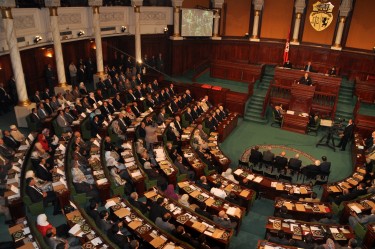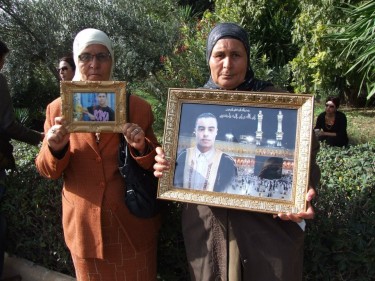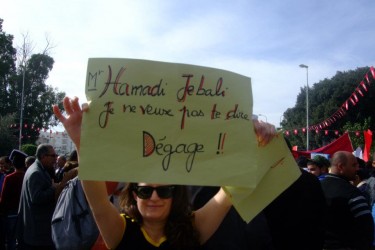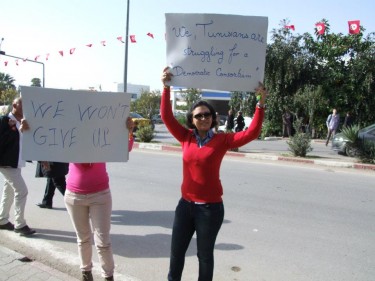This post is part of our special coverage Tunisia Revolution 2011.
November 22, 2011, was another turning point for Tunisia, the country which was the spark for the so-called Arab Spring. The constituent assembly, freely elected on October, 23 and responsible for taking charge of the draft of the new constitution, held its first session.
It was a long day not only for the 217 members of the assembly, but also for Tunisians who have been following the first session on television, radio and social media.

The inaugural session of Tunisia's democratically elected constituent assembly. Image by Ibtihel Zaatouri, copyright Demotix (22/11/11).
@sarah81m tweets [fr]:
Je crois j'ai jamais vu autant de monde suivre un debat parlamentaire pendant des heures… ca fait plaisir
During this session, Mustafa Ben Jaafar, president of the Democratic Forum for Work and Liberties, was elected president of the assembly by winning 145 votes.
Protests outside assembly headquarters

The families of Tunisian martyrs demanding justice. Image from Facebook page of Voices of the Arab Spring.
Hundreds of protesters, with different demands, gathered outside the headquarters of the assembly to put pressure on the representatives.
For instance, the families of those protesters who lost their lives during the revolution did not miss this opportunity to call for justice for those who were responsible for the deaths of their loved ones.
Other protesters, who have fears regarding the Islamist party Ennahdha, which won 89 seats, called for the protection of Tunisian women's rights – considered the most advanced in the Arab region.
Drafting a constitution that protects human rights and the rights of ethnic minorities, abolishes the death penalty, and refuses foreign intervention in the affairs of the Tunisian state, were among the demands of the protesters.
Journalist Olfa Riahi was there and shared her experience [fr] on her Facebook profile:
Une journée historique. Deux petites heures devant le parlement au Bardo pour voir comme nous sommes différents, passionnés, tous assoiffés d'une nouvelle Tunisie malgré des perceptions très diverses.(…) Les slogans retentissaient de chaque côté, dans l'adversité souvent mais presque jamais dans la violence
Slim Amamou (@slim404) tweets [fr]:
Beaucoup de monde a la manif. Qui a dit qu'il y aura 100 personnes? #22nov #tnac http://twitpic.com/7hrctr

A message from one protester to the expected Prime Minister Hamadi Jebali: ''Mr. Hamadi Jebali, I do not want to have to tell you 'Get Out'". Image posted on Facebook profile of Soukaina W Ajbetni Rouhi.
Though the protesters had different slogans and diverse demands, they all agreed that they will be closely watching the assembly and the new government, and will not accept any steps that might take them backwards.
Twitter reactions
”A historic day”, this is how November 22 was described – just like October 23 (Election Day) and January 14 (the day former President Zeine El Abidine Ben Ali fled to Saudi Arabia). Here are some of the reactions on Twitter:
@neotunisien: Encore un jour historique pour la Tunisie #tnac Inchallah zina
@kepler1208: la démocratie reste un processus long et douloureux à établir…mais la #tunisie réussira INCHALAH à relever ce défi par excellence #TnAC
@inesTN: Pas eu le temps de l'écrire, mais je le fais maintenant FIERE D ETRE TUNISIENNE :)) #tnAC #Tunisie #tnelec
Live session
The inaugural session was televised, aired on radio, and tweeted live. This is a first for a country where parliamentary sessions and decision making processes used to take place behind closed doors.
Mabrouka Mbarek (@mabmbarek), a representative at the assembly for the Congress for the Republic (the party that came second in the election), was tweeting the session live via the hashtag #tnAC. She even tweeted her vote concerning the assembly presidency, saying [fr]:
Transparence et opengov : pour une vraie rupture avec l'ancien regime. Un vote ouvert car nous representons le peuple
In other Arab countries
As Tunisia peacefully takes another step forward in its democratic journey, bloodshed continues in other Arab countries, where protesters are being murdered for their democratic aspirations. Here are some of the reactions from Twitter:
@mabmbarek: Alors que l’ #TnAC se reunie pour la 1 ere fois auj, j'ai une pensee speciale pour #Egypte #Yemen et #Syria
@oussemos: نقول الحمد لله #tnAC و بعد نشوف #Tahrir كي نشوف
@H_a_z_e_m: يجب ان لا ننسى اخواننا المصريين في نظالهم ضد قوات الامن و الجيش في وقت تجرى فيه اول جلسة للمجلس التأسيسي في بلادنا
The second session of the assembly took place on November 23. The assembly will also vote to choose a president and a prime minister. However, it is obvious already that Hamdi Jebali from Ennahdha will become prime minister and Moncef Marzouki from the Congress for the Republic, president. This is due to the three-party coalition formed by Ennahdha, the Congress for the Republic, and the Democratic Forum for Work and Liberties (20 seats).
This post is part of our special coverage Tunisia Revolution 2011.







